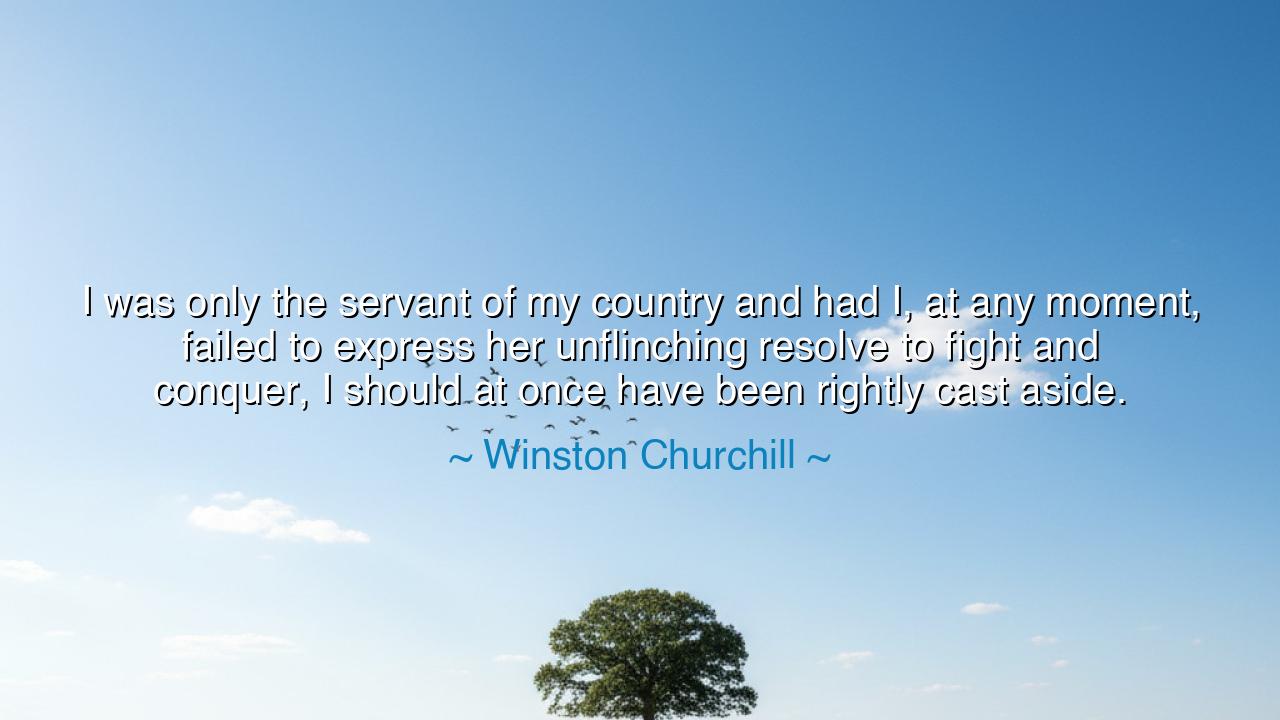
I was only the servant of my country and had I, at any moment
I was only the servant of my country and had I, at any moment, failed to express her unflinching resolve to fight and conquer, I should at once have been rightly cast aside.






“I was only the servant of my country and had I, at any moment, failed to express her unflinching resolve to fight and conquer, I should at once have been rightly cast aside.” So declared Winston Churchill, whose voice thundered through one of the darkest nights in human history. In this saying, he unveils a truth as old as leadership itself: that a true leader is not master but servant, not owner but vessel of the people’s will. His greatness lay not in personal ambition alone, but in his ability to embody the resolve of his nation, and to give words of steel to their silent determination.
The meaning of this quote shines forth with clarity. Churchill declares that if he had faltered—if he had shown weakness when the enemy pounded at the gates—then he would have betrayed the very spirit he was entrusted to uphold. He would have deserved to be “cast aside,” for a leader who does not reflect the people’s courage and who cannot inspire them in times of trial is unworthy of his charge. Leadership, then, is not about power, but about carrying the torch of resolve so that others may see the path through the storm.
We see the origin of these words in the crucible of the Second World War. Britain stood alone, bombed from the skies, threatened by invasion, its allies crushed beneath the weight of tyranny. In those days, Churchill’s speeches became more than oratory; they were lifelines. His famous declaration—“We shall fight on the beaches, we shall fight on the landing grounds…”—was not mere rhetoric, but the voice of a nation’s unbroken will. He served as the mouthpiece of Britain’s unflinching resolve to endure, to fight, and ultimately to conquer. Without such a voice, despair might have smothered the flame of resistance.
Consider the Blitz, when German bombs rained nightly upon London, Coventry, and countless towns. Civilians slept in underground shelters, awoke to shattered homes, yet carried on with life and duty. Their quiet courage needed a voice, and Churchill gave it to them. He was not inventing bravery; he was reflecting it. He was the servant of their endurance, shaping their silent strength into words that shook the world. This is the heart of his quote: a leader must mirror the fortitude of his people, not betray it with doubt.
The lesson for us is timeless: to lead is to serve. A true leader is not exalted for his own sake but stands as a vessel of the people’s spirit. When hardship comes, the leader’s task is to speak courage when others are silent, to express the resolve that lies buried in the nation’s heart. Should he falter, should he place his own fears above the people’s destiny, then he rightly loses his place. For the leader is no more than the voice and face of the people’s will.
This wisdom is not confined to nations or wars. In every sphere of life—family, community, workplace—the same truth endures. The parent must serve the family’s needs before their own pride. The teacher must serve the growth of the student, not the glory of the self. The leader of any cause must serve its purpose with humility and strength. To forget this is to invite failure, for leadership that feeds only the ego is brittle and soon broken.
Practically, then, let each of us who would lead remember: leadership is a stewardship. It demands humility, courage, and the constant remembrance that one serves something greater than oneself. Speak words that uplift, act in ways that reflect the deepest resolve of those you lead, and do not shrink when storms rise. If ever you falter, know that you risk being rightly cast aside, for the mantle of leadership belongs only to those who bear it in service.
Thus let Churchill’s words echo through time: “I was only the servant of my country.” Let this be the creed of all who lead. Not masters, but servants. Not tyrants, but voices of courage. And when you lead in this way, you will not only honor your people—you will become a beacon of strength that endures beyond your own years, as Churchill endures still, carried on the tide of history as the servant who became a symbol of victory.






AAdministratorAdministrator
Welcome, honored guests. Please leave a comment, we will respond soon